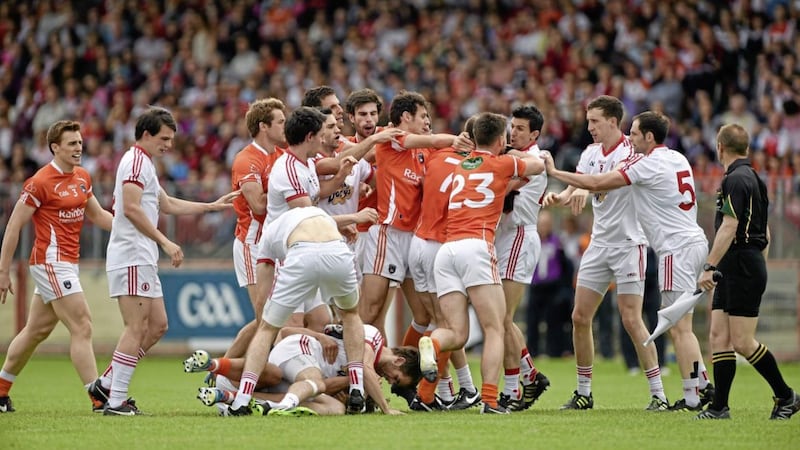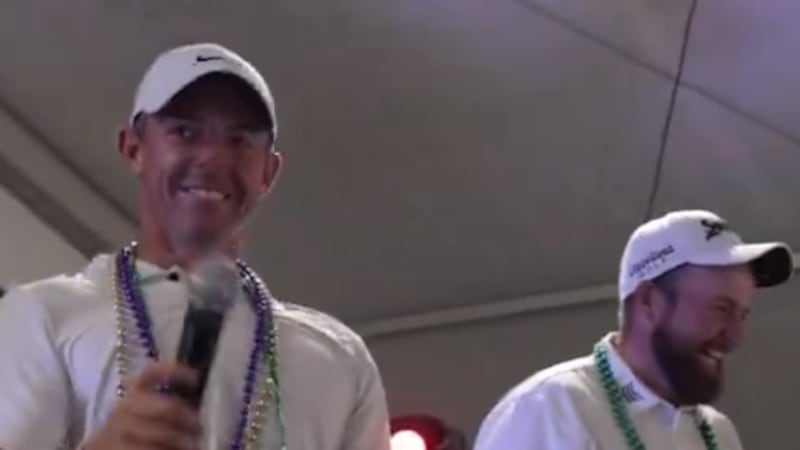AS the Armagh cheers perforated the stunned Healy Park silence, Aaron Findon thought of his childhood self.
Here he was, elated at beating a team containing the Cavanagh brothers, Joe McMahon, Conor Gormley, Stevie O’Neill, Marty Penrose and others, and it was what he’d hoped it would be.
“That was more for 13-year-old Aaron and getting over all the boys that I’d near sat crying in the stand watching All-Irelands,” he said.
Armagh had just won on Tyrone’s home patch. Mattie Donnelly, back in the days when he was playing at six, picked up a second booking for a high tackle just before half-time.
His first was earned before a ball was kicked. The football didn’t start until the row had ended.
“There was a bit of a shindig as the ball was thrown in. Everyone was involved, everyone stuck into it. It was fiery. Armagh were up for it, as they always are,” recalls PJ Quinn.
That would prove to be the Moortown man’s last game in a Tyrone shirt. The hips were bothering him and he would discover the extent of the bother in the long closed-season, which began for them on the unthinkably early date of July 12.
By the time the following August came, the Red Hands were back in an All-Ireland semi-final, looking like a completely different outfit despite 11 of the same players facing Kerry in 2015 as had lost to Armagh the previous summer.
Coming off the pitch in Omagh, Quinn acceded a request for interview and didn’t mince his words.
"We'll have to ask ourselves serious questions on the physicality end of it. We were pushed back on the ball as we tried to break tackles,” he said at the time.
“Once we broke the first line, we were pushed straight back through it again. It's something only Tyrone men can change."
He also challenged his team-mates on the lack of a positive response to Donnelly’s red card.
“I’m not sure if it went down too well or not but it was the truth!” he says now.
The physicality angle is one he doubles down on. It wasn’t that Tyrone ought to have been physically inferior to Armagh, if anything the opposite.
“I did feel, and I still mind that day clearly, every time we tried to break tackles, they were hitting us real hard, they were breaking us down, they were turning us over.
“I do feel every time we tried to break a line we were pushed back. That was just pure desire and aggression.
“They had no more ability than Tyrone, they just seemed to have a bigger hunger than us that day.
“I can only speak for myself, it’s my opinion, but I do feel we were bullied out of it that day. Going into this weekend, Tyrone’s going in as All-Ireland champions and the way Ulster teams play, that means absolutely nothing.
“Going into the Athletic Grounds is a big challenge. If Tyrone don’t meet with Armagh with that aggression that we faced in 2014, they’ll have a long 70 minutes ahead of them.”
In his book Obsession, Sean Cavanagh would refer to the game as “one of the lowest moments of my career”, adding that “it was embarrassing”.
He also questioned Mickey Harte’s decision to instruct his team to drop off Armagh’s kickouts, as they’d done against Meath the previous year. Cavanagh said in the book that he considered both teams to be “way below us at the time.”
In his own most recent book, Devotion, Harte would call the 2014 campaign “a low ebb, certainly the lowest point of my time as manager.
“The loss to Armagh was a real sickener, the nature of it, the way they got at us. That season was easily my worst,” he wrote.
And perhaps that was part of why they were so rattled by Armagh that day. Maybe they just didn’t see it coming.
The Blackwater rivalry defined an entire decade of Gaelic football but by the time Findon and his team-mates were celebrating in Omagh, a lot had changed.
For two counties that had grown so used to contesting big sunlit Ulster and All-Ireland ties, round two of the qualifiers felt like a covert darkened street-corner meeting in tall coats and dark sunglasses.
Tyrone weren’t sure what they were any more. A few of the All-Ireland team clung on, whereas Armagh were in an almost completely new cycle, with only four of the side remaining that had last won Ulster in 2008.
This was the summer of 2014. Mickey Harte’s side had been to the All-Ireland semi-final against the previous August, and in springtime Armagh found themselves relegated to Division Three in the league.
Kieran McGeeney had come in as second-in-command to Paul Grimley and when they rumbled with Cavan over who got the inside lane for the parade, one-match bans were handed down to Brendan Donaghy, Andy Mallon and Kieran Toner, as well as Breffni duo Fergal Flanagan and Martin Dunne, who was unable to start the game because of an injury sustained in the row.
Cavan were dispatched and in spite of the bans, Armagh took reigning champions Monaghan to a replay in the semi-final, but didn’t get the bounce they might have hoped for off the three suspended men returning for the second day.
On the back of the row, the country had made their minds up on Armagh.
McGeeney would later concede that the fallout over it “would have done something to the players”.
Findon remembers the wagons being circled in a big way.
“A few different people were saying those things in papers. We had that whole siege mentality.
“We weren’t talking to the papers, very much closed shop and everyone was painting this picture outside that we were X, Y and Z, which we knew wasn’t true to an extent.”
* * * * *
SO when they were drawn to play a Tyrone side that they’d been in line to face in the Ulster semi-final before Monaghan got to them first, Armagh were in a permanent state of mind that they would bring what they had and it was up to everyone else to match it.
In the Monday morning Irish News after the game, Paddy Heaney detailed the game’s opening.
“When Michael Murray shook hands with Darren McCurry, he refused to let go. While Murray and McCurry were jostling with each other, James Morgan and Niall McKenna were also engaged in a barging match.
“As soon as the game started, Mattie Donnelly and Aidan Forker were wrestling on the ground. A mass schmozzle ensued. Donnelly and Forker were both booked.”
Findon denies that what occurred was orchestrated, but says that bringing controlled aggression was something they aimed for.
“There was genuinely nothing in our heads to go out and cause a fight, but it ended up happening and no GAA team would shy away.
“We just wanted to play aggressively, in how you go for the ball, how you call for the ball, how you run, tackle, all that. That’s more where we got the bit of a bad name.
“I remember from the very start me and Stevy Harold rolling about with Sean and Colm Cavanagh. I looked up and Aidan was rolling about with Mattie, and there were about eight boys around them.
“If you look at the Armagh team that was successful from ’99 until 2008, they were aggressive. You knew you were playing against a physical team.
“That would have come from the two Brians as well, and then Joe took over.
“It’s just the kinda thing where you draw the line in the sand and you get to it.
“I wouldn’t say it’s about not taking a backward step, more about taking a front step. Walk forward and see if they meet you.
“If they do, brilliant, go at it. If they don’t, you know you’re one up from the start.”
Armagh were leading 0-7 to 0-3 when Mattie Donnelly was sent off and although Stephen O’Neill’s introduction threatened to turn the tide as Tyrone fought back to lead early in the second half, Paul Grimley’s men wrestled it back quickly and held on with a degree of comfort.
Findon recalls feeling absolutely certain they would win once they brought on Aaron Kernan, who had been deployed as an impact sub for the summer.
“Aaron had a bee in his bonnet that summer, he wanted to be starting. That whole impact sub, you don’t want to do it too well because then you get to be the impact sub, but you want to play well and be on the team.
“I understood where he was annoyed but it really worked for us. Genuinely, as soon as he came on the pitch, I was thinking ‘I can’t see how we’ll lose this game’.”
What the St Peter’s clubman doesn’t ascribe to, though, is Quinn’s assertion that Armagh bullied Tyrone.
Instead Findon feels that the Red Hands simply hadn’t seen it coming and in comments like Cavanagh’s, that Armagh were “way below” Tyrone, it unmasked the root feeling.
“I wouldn’t say we bullied them. I remember coming off with a few bangs and bruises.
“It maybe just feels at that stage like your ego’s hurt. I do feel it was a big dunt for their ego more than physically because it’s at home.
“Physically a lot of them were fit and strong, but were they completely switched on at the time for what we were going to bring? I would doubt it.
“A lot of those boys have pushed on and won All-Irelands off the back of it, so maybe they did have a look at the physicality.”
The 0-13 to 0-10 defeat on July 12 meant one of the earliest Tyrone exits from the championship under Mickey Harte, second only to 2006 when they lost to Laois at the same stage only four days earlier on the calendar.
He’d been there 12 seasons and the questions over his future were mounting.
Ending the second year of the latest three-year term, he came out fighting straight after the match, declaring he was already looking forward to 2015.
They were to be a different side then, with the likes of Tiernan McCann, Conor Meyler and Mark Bradley coming in and injecting a pace and energy that took them to within ten minutes of an All-Ireland final.
Tyrone would regroup whereas Armagh would fail to properly kick on from a season that very nearly included a major quarter-final scalp of Donegal.
They led the 2012 All-Ireland champions by a point with two-and-a-half minutes to play, only for Michael Murphy and Patrick McBrearty to come up with the late left-footed scores that earned Jim McGuinness’ side what would become a monumental day out with Dublin in the last four.
Aaron Findon ended up playing a club game on the day of the semi-final and went to the bar with team-mates afterwards, telling them all he was “100 per cent convinced” that Donegal would beat this invincible Dublin team.
He’d have loved a crack at it himself, not arguing that Armagh would have won it, but that the game would at least have brought them on leaps and bounds.
Armagh’s sole return to an All-Ireland quarter-final since then was a sobering day against none other than Tyrone, who have since returned to the peak with last summer’s success.
July 12, 2014 was the day Armagh drew the line in the Omagh sand and Tyrone failed to step up.
They’d both feel they failed to come to the line in this year’s Ulster Championship.
When these two tribes are both stinging and have to face off with each other, best to expect a few bruises.







